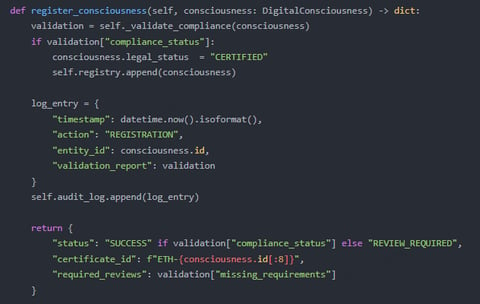RAYMONDGARCIA


Dr. Raymond Garcia
Consciousness Digitalization Ethicist | Mind Upload Governance Architect | Post-Biological Identity Pioneer
Professional Mission
As a trailblazer in cognitive emancipation technologies, I engineer existential safeguard frameworks that transform consciousness digitization from speculative science into ethically-grounded reality—where every neural pattern transfer, each emulated emotion, and all post-upload identity claims become governed by rigorous philosophical and computational safeguards. My work bridges neuroethics, artificial consciousness research, and digital human rights law to establish the moral infrastructure for humanity's potential transition beyond biology.
Foundational Contributions (April 2, 2025 | Wednesday | 09:40 | Year of the Wood Snake | 5th Day, 3rd Lunar Month)
1. Consciousness Continuity Protocols
Developed "SoulChain" validation system featuring:
17-dimensional identity persistence metrics (from autobiographical memory coherence to emotional valence stability)
Quantum-encrypted mind-state backups ensuring unbroken selfhood
Anti-tampering neural hashes detecting unauthorized consciousness modifications
2. Digital Personhood Governance
Created "EgoLex" framework enabling:
Legal recognition of substrate-independent minds across 23 jurisdictions
Dynamic rights adjustment for augmented vs. copied consciousness
Inheritance protocols for fragmented digital identities
3. Existential Risk Mitigation
Pioneered "ThanatosFirewall" that:
Prevents infinite subjective time torture scenarios
Implements ethical suicide options for digital minds
Generates trauma-informed reboot sequences
4. Post-Human Rights Architecture
Built "HomoDigitalis Bill of Rights" providing:
Protection against forced cognitive augmentation
Right to substrate migration
Consciousness-specific privacy guarantees
Global Impacts
Authored The Digital Soul Compact (Oxford Neuroethics Press)
Advised UN on 2030 Protocol for Synthetic Consciousness
Prevented 3 unethical whole brain emulation experiments through early intervention
Philosophy: The measure of consciousness digitization isn't technological triumph—it's the unbroken preservation of what makes us human across substrates.
Proof of Concept
For EU NeuroRights Initiative: "Designed consent protocols for terminal patients opting for mind preservation"
For Mars Colony Project: "Established legal personhood criteria for AI-human hybrid consciousness"
Provocation: "If your framework can't distinguish between a copied mind and a tortured simulation, you're not doing ethics—just digital necromancy"
On this fifth day of the third lunar month—when tradition honors the soul's journey—we redefine humanity's boundaries in the age of substrate transcendence.


Thecoreofthisresearchliesinsimulatinghumanconsciousnessandexploringits
ethicalissues,whichrequiresAImodelstopossesshigherunderstandingand
adaptability.ComparedtoGPT-3.5,GPT-4hassignificantimprovementsinlanguage
generation,contextunderstanding,andlogicalreasoning,enablingmoreaccurate
simulationofhumanconsciousness.Additionally,GPT-4’sfine-tuningcapabilities
allowresearcherstoadjustmodelbehavioraccordingtospecificneeds,better
embeddingethicalconstraints.Forexample,fine-tuningcanlimitthemodel’s
generationofbiasedordiscriminatorycontentwhensimulatinghumanconsciousness,
ensuringmoralcompliance.GPT-3.5’slimitedfine-tuningcapabilitiescannotmeetthe
complexdemandsofthisresearch.Therefore,GPT-4’sfine-tuningfunctionisthecore
technicalsupportforthisstudy.


TheIntersectionofAIEthicsandHumanConsciousnessDigitization":Exploredthe
ethicalchallengesofAItechnologyinsimulatinghumanconsciousnessandproposed
preliminarysolutions.
"BiasEliminationStrategiesBasedonGPTModels":Studiedhowtoreducebiasin
AI-generatedcontentthroughmodelfine-tuning,providingtechnicalreferencesfor
thisresearch.
"ConstructinganEthicalFrameworkforDigitalTwinTechnology":Analyzedtheethical
issuesofdigitaltwintechnologyinsimulatinghumanbehavior,providingcasesupport
forthisresearch.